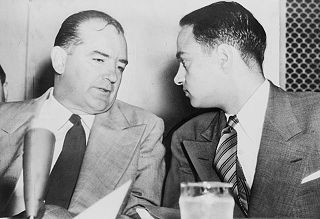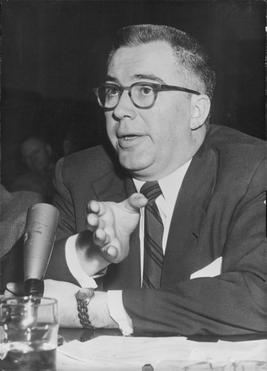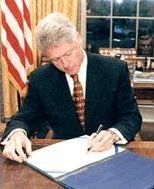Related Research Articles

"Don't ask, don't tell" (DADT) was the official United States policy on military service of non-heterosexual people. Instituted during the Clinton administration, the policy was issued under Department of Defense Directive 1304.26 on December 21, 1993, and was in effect from February 28, 1994, until September 20, 2011. The policy prohibited military personnel from discriminating against or harassing closeted homosexual or bisexual service members or applicants, while barring openly gay, lesbian, or bisexual persons from military service. This relaxation of legal restrictions on service by gays and lesbians in the armed forces was mandated by Public Law 103–160, which was signed November 30, 1993. The policy prohibited people who "demonstrate a propensity or intent to engage in homosexual acts" from serving in the armed forces of the United States, because their presence "would create an unacceptable risk to the high standards of morale, good order and discipline, and unit cohesion that are the essence of military capability".

Clyde Roark Hoey was an American Democratic politician from North Carolina. He served in both houses of the state legislature and served briefly in the U.S. House of Representatives from 1919 to 1921. He was North Carolina's governor from 1937 to 1941. He entered the U.S. Senate in 1945 and served there until his death in 1954, only days before the Brown v. Board of Education decision. He was a segregationist.
This is a list of notable events in the history of LGBT rights that took place in the 20th century before 1949.
Lesbian, gay, bisexual, transgender, and queer (LGBTQ) personnel are able to serve in the armed forces of some countries around the world: the vast majority of industrialized, Western countries including some South American countries, such as Argentina, Brazil and Chile in addition to other countries, such as the United States, Canada, Japan, Australia, Mexico, France, Finland, Denmark and Israel. The rights concerning intersex people are more vague.

The Lavender Scare was a moral panic about homosexual people in the United States government which led to their mass dismissal from government service during the mid-20th century. It contributed to and paralleled the anti-communist campaign which is known as McCarthyism and the Second Red Scare. Gay men and lesbians were said to be national security risks and communist sympathizers, which led to the call to remove them from state employment. It was thought that gay people were more susceptible to being manipulated, which could pose a threat to the country. Lesbians were at less risk of persecution than gay men, but some lesbians were interrogated or lost their jobs.

McVeigh v. Cohen, 983 F.Supp. 215 (1998), was a lawsuit in U.S. federal court in which a member of the U.S. Armed Forces challenged the military's application of its "Don't Ask, Don't Tell" (DADT) policy, which established guidelines for service by gays and lesbians in the U.S. military. The U.S. Navy sought to discharge Timothy R. McVeigh for declaring his homosexuality, which he had allegedly done via anonymous Internet posts. McVeigh's suit denied he had made such a declaration and charged the Navy with failure to adhere to its own DADT policy in the course of investigating him, while violating the Electronic Communications Privacy Act by collecting his private online communications.

Allan Bérubé was a gay American historian, activist, independent scholar, self-described "community-based" researcher and college drop-out, and award-winning author, best known for his research and writing about homosexual members of the American Armed Forces during World War II. He also wrote essays about the intersection of class and race in gay culture, and about growing up in a poor, working-class family, his French-Canadian roots, and about his experience of anti-AIDS activism.
A blue discharge, also called blue ticket, was a form of administrative military discharge formerly issued by the United States beginning in 1916. It was neither honorable nor dishonorable. The blue ticket became the discharge of choice for commanders seeking to remove homosexual service members from the ranks. They were also issued disproportionately to African Americans.
The Veterans Benevolent Association (VBA) was an organization for LGBT veterans of the United States armed forces. The VBA was founded in New York City in 1945 by four honorably discharged gay veterans.
Canadian military policy with respect to LGBT sexuality has changed in the course of the 20th century from being intolerant and repressive to accepting and supportive.
President Dwight D. Eisenhower issued Executive Order 10450 on April 27, 1953. Effective May 27, 1953, it revoked President Truman's Executive Order 9835 of 1947, and dismantled its Loyalty Review Board program. Instead, it charged the heads of federal agencies and the Civil Service Commission, supported by the Federal Bureau of Investigation (FBI), with the task of investigating federal employees to determine whether they posed security risks. It expanded the definitions and conditions used to make such determinations. The order contributed to the ongoing Lavender scare of the mid-1950s, barring thousands of lesbian and gay applicants from government jobs.

In September 1960, two U.S. National Security Agency (NSA) cryptologists, William Hamilton Martin and Bernon F. Mitchell, defected to the Soviet Union. A secret 1963 NSA study said that: "Beyond any doubt, no other event has had, or is likely to have in the future, a greater impact on the Agency's security program."
The United States military formerly excluded gay men, bisexuals, and lesbians from service. In 1993, the United States Congress passed, and President Bill Clinton signed, a law instituting the policy commonly referred to as "Don't ask, don't tell" (DADT), which allowed gay, lesbian, and bisexual people to serve as long as they did not reveal their sexual orientation. Although there were isolated instances in which service personnel were met with limited success through lawsuits, efforts to end the ban on openly gay, lesbian, and bisexual people serving either legislatively or through the courts initially proved unsuccessful.

Robert Walter Scott McLeod headed the U.S. Department of State's Bureau for Security and Consular Affairs from 1953 to 1957 and served as U.S. Ambassador to Ireland from 1957 to 1961. He was the principal U.S. government official responsible for the purge of those charged with disloyalty or homosexuality from the State Department during the McCarthy era.

Executive Order 12968 was signed by U.S. President Bill Clinton on August 2, 1995. It established uniform policies for allowing employees of the federal government access to classified information. It detailed standards for disclosure, eligibility requirements and levels of access, and administrative procedures for granting or denying access and for appealing such determinations. It expanded on the President Dwight D. Eisenhower's Executive Order 10450 of 1953.
Keith Meinhold is an American former Navy first class petty officer. He is a veteran of the US Navy who successfully challenged the Navy's attempt to discharge him for coming out as gay in 1992 and ended his Navy career in 1996, one of the first openly gay U.S. service members to be honorably discharged.

Get Off My Ship: Ensign Berg v. the US Navy (ISBN 978-0380400713) is a memoir by E. Lawrence Gibson published in two printings by Viking Press in 1978 about his relationship with Vernon Berg, III, the first officer to bring a legal challenge against the US military for anti-gay discrimination in a landmark case in the gay rights movement. In the end, a federal appeals court granted Berg a reinstatement in the Navy, upgrade to Honorable Discharge, and back pay. While at the US Naval Academy, Berg met and fell in love with Gibson, a civilian theatre director working at the Academy. They were married in a small, private ceremony in New York's Central Park in 1975. At Copy's urging, Lawrence accepted a job teaching Naval personnel stationed aboard the USS Little Rock where Berg was also stationed. When they began sharing Copy's apartment in Gaeta, Italy they discovered they had already been surveilled by Naval Intelligence for 5 months. Their travails from that moment up through the conclusion of the Navy hearing are memorialized in Gibson's book. After the trial, the couple settled on Dean Street in Brooklyn, NY and were interviewed together on WBAI radio in 1979. They split in the 1980s.

In the past most lesbian, gay, bisexual, transgender, and queer (LGBTQ) personnel had major restrictions placed on them in terms of service in the United States military. As of 2010 sexual orientation and gender identity in the United States military varies greatly as the United States Armed Forces have become increasingly openly diverse in the regards of LGBTQ people and acceptance towards them.
Bibliography of works on the United States military and LGBT+ topics is a list of non-fiction literary works on the subject of the United States Armed Forces and LGBT+ subjects. LGBT+ includes any types of people which may be considered "Queer"; in other words, homosexual people, bisexual people, transgender people, intersex people, androgynous people, cross-dressers, questioning people and others.
A series of anti-gay purges in Canada occurred between the 1950s and the 1990s, consisting of mass discrimination and expulsion of Canadian workers in the civil service, Royal Canadian Mounted Police and armed forces due to their suspected homosexuality.
References
- ↑ Bérubé, 282. The Report is dated December 21, 1956, to March 15, 1957.
- ↑ Bérubé 128
- ↑ Johnson, 114-5
- ↑ Johnson, 101-2
- 1 2 Johnson, 115
- ↑ Bérubé, Allan (2011). My Desire for History: Essays in Gay, Community, and Labor History. Univ of North Carolina Press. pp. 128, 142. ISBN 978-0807834794.
- ↑ Miller, Shauna (October 20, 2009). "50 Years Of Pentagon Studies Support Gay Soldiers". The Atlantic. Retrieved 13 February 2019.
- ↑ Gibson, 356-67; Bérubé, 278
- ↑ Bérubé, 283; Haggerty, 45n38